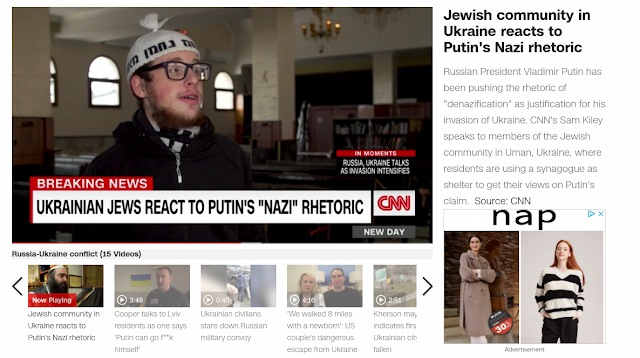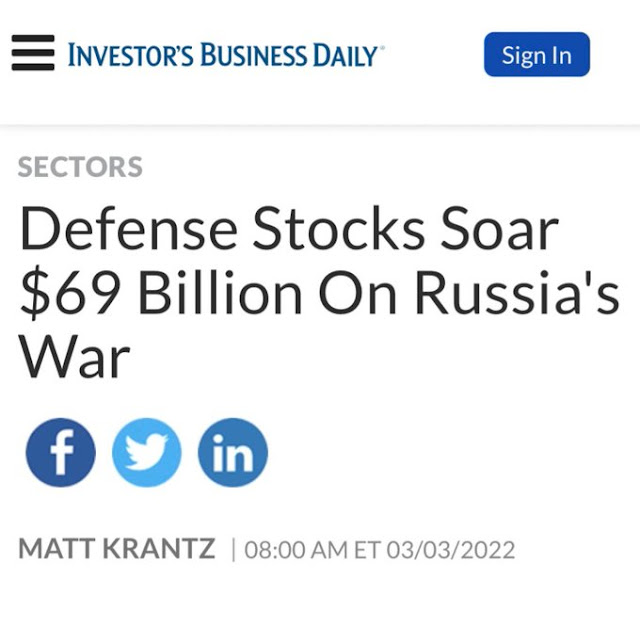That truth is the first casualty of war is a bromide I used to think applied to, you know, wars. The forever wars of the project to control energy and its transport have been with us so long at this point that one might assume the fog is ever present. Who knew it could get so much thicker?
Yesterday myriad people here in the U.S. insisted that I toe the line on viewing Russia's attack on Ukraine devoid of context other than the prevailing notion that it is due to one madman, who they literally call "the new Hitler."
They sent me links to CNN of all sources to counter my belief that the current government of Ukraine has neo-Nazi allies who have killed thousands of civilians in the Donbas since the 2014 U.S.-sponsored coup. CNN! The anchor screaming "another of Putin's LIES!" probably seems quite normal to those enveloped in the fog of nationalistic propaganda but instead it reminded me of how long I've been abstaining from the media offered up by our corporate overlords. (Or should I call them oligarchs?)
The corporate media in the U.S. made a pretense of considering all sides decades ago when I was still consulting it for information. There is no such pretense now.
For years my left-leaning friends have recommended RT (formerly known as Russia Today) as a source for news and analysis you won't get from CNN and its ilk.
Host to commentators like Lee Camp and Jesse Ventura, RT is now banned in Europe and the U.S.
Camp delivers social commentary with humor, much like George Carlin did in my younger days. At his suggestion, I've now subscribed to his content via a link on his website where I offered up my email address.
How much longer will my inbox be a personally curated information feed? I suspect not long.
Australian blogger Caitlin Johnstone has pointed out that "Defending freedom and democracy sure requires an awful lot of censorship." In a trend that began with suppressing debate on the pandemic, labels are slapped on information that does not conform to the official version of reality.
Jesus Christ. Can't even 'like' a tweet about peace talks without being warned that I'm doing a wrongthink. This is getting so crazy, and is likely to grow more so. pic.twitter.com/59eqm5kf4W
— Caitlin Johnstone ⏳ (@caitoz) March 1, 2022
If the U.S. and NATO are so right and Russia is so wrong at this moment in history, why are the U.S. and other NATO countries blacking out the Russian point of view? What are they scared of?
In another sign of troubling times for truth, the information wars began playing out in classrooms almost immediately.
A 65-year-old substitute teacher and journalist has been suspended from teaching in Arlington, Virginia for giving his students a balanced perspective on the Russia-Ukraine conflict. Mainstream media says he "spread Russian propaganda." So much for freedom of speech. pic.twitter.com/qSix0FBdvl
— Alex Rubinstein (@RealAlexRubi) March 3, 2022
Back in the day, presenting alternative views was considered both fair and educational. If young people were not given opportunities to practice evaluating information and weighing the merits of competing ideas, how would they learn critical thinking?
As just one example, yesterday the world was inflamed by the lie that Russia had bombed the Babi Yar Holocaust memorial in Ukraine. According to ynet, an Israeli website, that is simply not true. How can we know for sure? We can't, but open access to information supports sifting through falsehoods and truths to continuously adjust our understanding.
Censorship both overt and covert is favored by our corporate overlords because it protects their profit schemes from criticism.
Yes, Russia is wrong to bomb Ukraine. Yes, people are suffering there and suffering as refugees (especially if they appear to be African).
None of that changes the fact that censorship is dangerous because it disables the flow of ideas that might, if we're lucky, save the world from nuclear Armageddon.





No comments:
Post a Comment